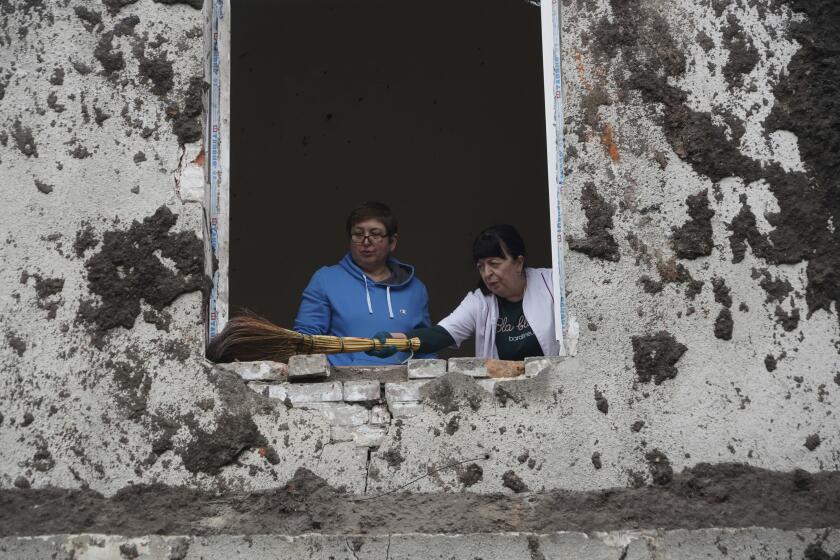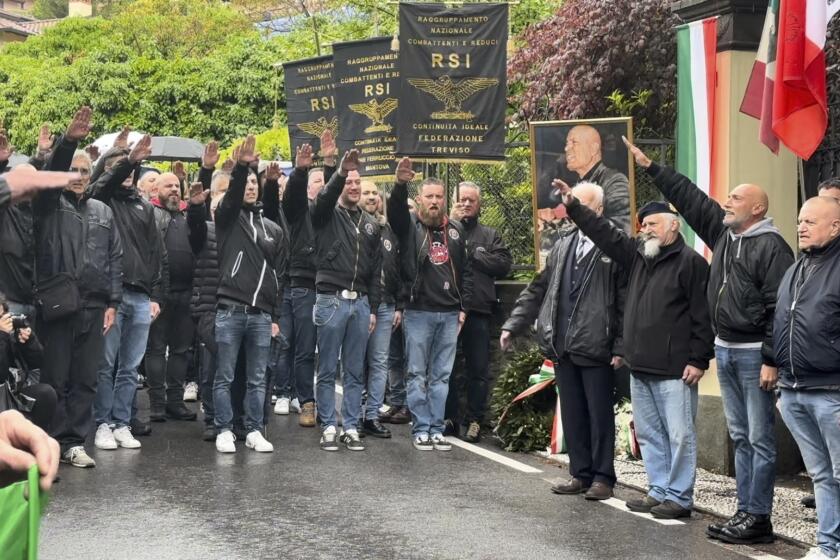Gang worker wounded in the body but not in his heart
Calvin Hodges insists he is not angry at the men who shot him.
“I’m angry at the mind-set,” Hodges said on a recent afternoon in Nickerson Gardens, the Watts public housing complex where he grew up, and nearly died.
At 35, he’s seen it from all sides now during a journey that has taken him from repeated run-ins with the police to being praised by them as a hero.
In the three months since Hodges was shot, leaving him partly paralyzed, he has become an emblem of all that is risky about the city’s campaign to interlace traditional policing with gang intervention and street outreach. And if the authorities’ suspicions are right -- that a deadly wave of violence followed Hodges’ shooting because he was in the hospital, unavailable to keep the peace -- he will become an emblem, too, of why City Hall believes that risk is worth it.
Within weeks of Hodges’ shooting, Nickerson Gardens degenerated into a terrible spiral of violence after several years of relative calm. At least five men have been shot to death in the area since Nov. 22; police believe the killings are linked to a dispute within the Bounty Hunters, Nickerson’s dominant gang.
Alongside persistent police efforts and other programs aimed at reducing crime, “he was a key to stopping bad things from happening there,” said Capt. Phillip Tingirides of the LAPD’s Southeast Community Police Station.
Hodges was not always the highly regarded gang interventionist he is today -- far from it. Court documents filed in the early 1990s painted a portrait of a menacing young man with a dark future.
Hodges was charged with robbery as a juvenile, and a few years later was accused, though not convicted, of shooting in the direction of police officers. At the time, according to the documents, Hodges told the police that he’d been employed “collecting junk” and in “candy sales,” earning roughly $300 per month.
It was around that time, however, that Hodges began to commit himself to a new life, he said. He began to study the crushing poverty around him, the effect of drugs, the limitations of a neighborhood where, according to one city-commissioned study, half of adults don’t have a high school diploma and a third didn’t finish ninth grade.
“I saw the families up one day and down the next, falling to the drugs,” he said. “I saw kids that had nice shoes, but not enough to eat. I saw the violence -- the bullets that can come out of anywhere.”
Hodges became an unlikely but valued ally of the city, working as a gang interventionist, first on his own, and then eventually as a paid employee of Kush Inc., a nonprofit group contracted to provide city-sponsored intervention services in the Watts area.
Hodges developed a reputation as a passionate advocate for Watts’ youths; he was a fixture last year at Summer Night Lights, the city’s lauded program keeping parks open late, during peak hours for gang activity.
He also became known as a fearless outreach worker, “One of the intervention workers who would consistently get into people’s faces when they were about to do something,” Tingirides said.
Hodges has persuaded gangsters to remove their tattoos and has steered kids into sports and educational programs, but on several occasions, he’s also confronted gangs as they were preparing to fight -- in one case as a gang was loading its weapons, including AK-47s, he said.
“People call me 24/7,” he said. “People call me before they call law enforcement. Because around here, if you call law enforcement, people hide. If you call me, I’m not going to rest. I’m going to give us a chance.”
The night of Oct. 30, Hodges was on what he calls “patrol” outside the Nickerson recreation center, looking for youngsters he’d classified as “high risk” -- “who can blow up any time.”
He stopped to talk to a 16-year-old whose brother had just been sent to prison, possibly for life. The boy, he sensed, was feeling anguished and resentful.
“I was reaching him. I could tell,” Hodges said.
Then, the sound of gunfire.
“I notice the kid was shot. I see him freeze up,” Hodges said. “I grabbed the kid. I threw him down, and I’m talking to him: ‘Stay down! Stay down!’”
The boy, whose identity has not been released, was shot in the leg and not seriously wounded. Hodges was shot three times. The first bullet grazed his cheek. The second skimmed his shoulder. The third penetrated his neck and stopped near his spine. “I just dropped,” Hodges said. “I started communing with God. It was either my time or not.”
Police on foot patrol responded almost immediately; one of them recognized Hodges. He was whisked away in an ambulance.
Within a few days, police had arrested two teenagers -- the alleged shooter and the alleged gun supplier. Authorities said they are also considering whether to charge a third teenager who is suspected of driving the group’s car.
The youths’ identities have not been released because of their ages; all are from Watts. Investigators said Hodges was not the intended target.
Hodges was in the hospital and in rehab for six weeks. Now, he’s back home with his fiancee and two of his five children -- credited by many with saving the boy from further injury, or worse.
“He threw his body over his client’s body,” said “Big Mike” Cummings, executive director of We Care Outreach Ministry and another well-known intervention worker. “That was his first instinct. . . . I just pray to God to bring him back up on his feet.”
“It was heartbreaking,” said Guillermo Cespedes, the city’s director of gang reduction and youth development. “He was pretty heroic.”
Hodges’ medical bills are mounting. Intervention workers recently took to KJLH-FM (102.3 ) to raise money for Hodges. They asked listeners to donate $102.03 for his family and medical expenses. A fundraising dinner will be held Friday at the Watts Labor Community Action Committee.
Now that he’s back home, Hodges is doing what he can to tamp down the violence again -- though he is mostly confined to his small apartment. Neighbors drop by seeking advice, he said, and he’s been working the phones.
“I’m doing what I’m able to do,” he said. “I’m trying to keep my spirits high. You don’t want to stay down. It don’t make things better.”
More to Read
Start your day right
Sign up for Essential California for news, features and recommendations from the L.A. Times and beyond in your inbox six days a week.
You may occasionally receive promotional content from the Los Angeles Times.








